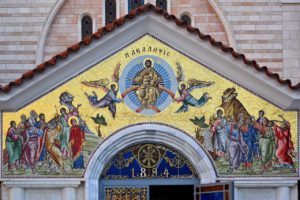Acts 15: 1-2, 22-29 (RM) or Acts 16: 9-15 (RCL); Psalm 67; Revelation 21: 10-14, 22-23 (RM) or 10, 22-27, 22: 1-5 (RCL); John 14: 23-29.
How can you have inner peace when you don’t feel safe?
More pointedly, how can you be at peace when you know you’re not safe?
You would think one of the safest places to be, one of the safest things to be doing, is grocery shopping in your neighbourhood on a Saturday afternoon.
“Pure evil,” it was called, what happened. Pure coldblooded murder. Skin colour hatred, racialized contempt at its unthinkable extreme. A deep chasm opened up to reveal a deadly core below the surface of a simple weekly routine in your own city.
Now, we’re hearing Black folks in Buffalo saying, “we’re scared.” Scared to go out, scared of losing their loved ones, scared knowing that the caution they’re been used to taking for so long, isn’t enough to keep them safe from violence.
Jesus is depicted in the Gospel this week telling his disciples before the events of his death, “Peace I leave with you … Do not let your hearts be troubled or afraid.” How does that not sound trite in such a time? What do these words mean when fear crosses over into terror? Or terror into outrage?
Christians in the first few centuries of the church were not unfamiliar with fear. The earliest Christmas sermon text we have dates from the year 361 and was preached in North Africa to a community seemingly paralyzed with fear. Although the Edict of Milan in 313 had granted Christians legal immunity from persecution, the later emperor Julian used divisions between Christian groups to favour one and persecute another, in order to weaken the movement. In his sermon, Bishop Optatus of Milevis cites the example of the persecution of the Holy Innocents by Herod to encourage his people to stand fast in the face of ever-new dangers, and to keep their hearts in peace born out of faith in the risen Christ.
The writers of the Gospel of John were apparently doing something similar. They weave these simple sayings attributed to Jesus into a more complex theological fabric that gives them not merely a context, but an anchoring in transcendent realities. Leave aside the disconcertingly patriarchal weight of “Father” for the moment, and just take a look at the profound intimacy pervading the dynamic relation between Christ, incarnate in our own human flesh, and the Holy One beyond all knowing. The intense love between them leads to vulnerability, not safety. Jesus’ death on the cross represented the apex of divine vulnerability to human evil. As a result, today, those peoples and groups of Christians who suffer prejudice, persecution, economic exploitation, political terror, right up to invasion by brutal enemy forces, look to the awareness of that undying holiness, the risen Christ, walking with them in what they suffer, standing beside them in solidarity.
Apart from taking common-sense security precautions, how do we guarantee our own safety, or that of those we love? We can’t. Of course we’re scared.
But perhaps the point is: How can you feel safe, if you don’t have inner peace?
© Susan K. Roll
Susan Roll retired from the Faculty of Theology at Saint Paul University, Ottawa, in 2018, where she served as Director of the Sophia Research Centre. Her research and publications are centred in the fields of liturgy, sacraments, and feminist theology. She holds a Ph.D. from the Catholic University of Leuven (Louvain), Belgium, and has been involved with international academic societies in liturgy and theology, as well as university chaplaincy, Indigenous ministry and church reform projects.





Thank you, Susan! I remember an author writing that we can’t prevent the tragic, but in some ways we can prepare for it; I was always a little befuddle by this statement. How do I prepare for what I hope will never happen, but does? You encourage me by suggesting that the starting point is inner peace, not safety. I am thinking on this…
“The intense love between (Christ Incarnate, and the Holy One) … leads to vulnerability, not safety.” In some ways, I have known this for many years. In other ways, I learn again every morning that God’s power is manifest in the vulnerability I prefer to conceal. I pray to know more deeply how my weakness is a place of possibility for God’s strength.